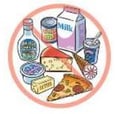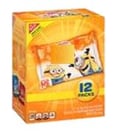Milk Free Diet
- Why does my child need this diet?
- Is milk free different than lactose free?
- Doesn’t my child need cow’s milk to grow?
- How do I get started on a milk free diet?
- How do I read food labels?
- Tips for Avoiding Milk
- Food choices
- What are some brands of milk free margarine?
- What are some common brands of milk free food products?
- For more information
- Nutrition Recommendations:
Why does my child need this diet?
Some children are allergic to milk proteins. This means they should not eat foods or ingredients in foods that contain milk protein. Foods with milk protein include cheese, milk, yogurt and cream. 
Is milk free different than lactose free?
Yes. A milk allergy is very different from milk or lactose intolerance. Your child must avoid all forms of milk protein. Children with lactose intolerance can sometimes tolerate small amounts of milk products. See the Low-Lactose Diet teaching sheet for more information.
Doesn’t my child need cow’s milk to grow?
Taking cow’s milk out of the diet may make it difficult for your child to get enough calories, calcium, riboflavin, Vitamin D and protein. Supplements may be needed. Talk with your child’s doctor or dietitian. They may want you to use drink substitutes and supplements. Many milk substitutes are not good cow’s milk substitutes for children under 2 years old or without close medical supervision. Be sure to talk with your child’s health care provider.
How do I get started on a milk free diet?
- Make a list of foods to avoid. Look at your food at home. Read labels to find out which foods are milk free. Make a list of foods that you need to find a substitute for.
- Make a list of foods to include. Start with single-ingredient foods like fruits and vegetables. See the food choices table for ideas.
- Go shopping. Start with your local grocery store. If you can’t find all of the items you need, try a specialty grocery store or shop online. Ask your dietitian for a list of resources for purchasing allergen-free foods.
- Find a safe beverage. Talk to your doctor or dietitian. They can help you find a beverage that will meet your child’s nutrient needs.
How do I read food labels?
There is a law that says that the source of ingredients for some food allergens must be on the food label. This law includes milk.
- Read all labels. This includes anything that may go in your child’s mouth or on their skin. Read the label of food, medicine, vitamins, lotion, mouthwash, toothpaste, and pet food.
- Read the label every time you buy the product. Ingredients can change without warning.
The allergens can be found on the label in two ways:
- In the ingredient list. This list must state the common name, such as milk. The common name may be in parentheses after the ingredient name.
- In the “contains” statement. This always lists the common name, such as milk.
Example Ingredient Statement: 
Ingredients
UNBLEACHED ENRICHED FOUR (WHEAT FLOUR, NIACIN, REDUCED IRON, THIAMINE MONONITRATE {VITAMIN B1}, RIBOFLAVIN {VITAMIN B2}, FOLIC ACID), SOYBEAN OIL, CHEDDAR CHEESE (CULTURED MILK, SALT AND ENZYMES), TAPIOCA DEXTRIN, SALT, AUTOLYZED YEAST EXTRACT (CONTAINS BARLEY), CALCIUM CARBONATE (NATURAL SOURCE OF CALCIUM), LEAVENING (CALCIUM PHOSPHATE AND/OR YEAST), NATURAL FLAVOR, ANNATTO EXTRACT (VEGETABLE COLOR).CONTAINS WHEAT, MILK.
Tips for Avoiding Milk
- The “Tips for Avoiding Your Allergen” handout from FARE lists ingredients that mean milk.
- Avoid foods with a manufacturer’s warning for milk. This warning lets you know that there may be cross-contact with an allergen. Phrases like “may contain”, “processed in”, or “manufactured on” may be used. These warnings may show up anywhere on the label.
- Some processed meats, like hot dogs or lunchmeat, contain milk ingredients. Always read the label before purchasing processed meats.
- “Nondairy” does not mean milk-protein free. Read the ingredient list to make sure the product does not contain milk protein.
Food choices
This is a list of suggestions only. Always read labels before eating foods.
| Food Type | Choose | Avoid |
|---|---|---|
| Beverages | Enriched soy or pea protein (caution with children under 2 years of age); soy infant formula; calcium fortified juice in limited amounts. | Cow’s milk; buttermilk, nonfat dry milk; evaporated or condensed milk; cocoa mixes containing milk, milkshakes. |
| Breads and starches | Milk-free breads (may include but not limited to buns, bagels, English muffins, tortillas or pita bread); plain rice or pasta; dry or cooked cereal, milk-free crackers, milk-free pancakes or waffles, french toast made without milk. | Any that contain milk solids or whey; pancakes, waffles or french toast made with milk; crackers made with milk or cheese; macaroni & cheese; canned spaghetti products and other rice or pasta products that contain milk. |
| Cheese | Milk free substitutes made from soy, pea, rice or other milk free ingredients. Some will have casein – read labels carefully. | All cheese, cottage cheese, ricotta cheese. |
| Condiments | Salt, pepper, spices, ketchup, mustard, steak sauce, salsa, jelly, jam; barbeque sauce, soy sauce; gravy made without milk | Cheese sauce; Stroganoff sauce; butter-flavor popcorn seasoning; non-dairy creamer may contain milk. |
| Desserts and snacks | Homemade cake, cookies or pie made without milk, butter, or margarine that contains milk, gelatin, sorbet, fruit ice, Popsicles®; fruit snacks, marshmallows, hard candy, jellybeans, gum drops; sugar, honey, molasses, milk free chocolate bars and candy, 100% cocoa powder. | Any store-bought or bakery prepared desserts made with milk ingredients; ice cream, frozen yogurt, yogurt, pudding, custard, whipped cream, milk chocolate candy; fudge; butter-flavored candies, sherbet and caramels may contain milk. |
| Fats | Milk-free margarine; vegetable oil or shortening; mayonnaise; Italian salad dressing, fried foods made without milk products in clean oil. | Butter, margarine; cream cheese; sour cream; sauces made with butter, cream or cheese; salad dressings with cheese, buttermilk or milk added; chips with cheese or sour cream flavoring. |
| Fruits | Fresh, canned, frozen or dried. |
Any made with milk products; fruits with yogurt coating. |
| Meats and meat substitutes | Fresh beef, pork, chicken, turkey, fish; cooked or hardboiled eggs; nuts, peanut butter; dry beans, peas or lentils. | Meat, fish or eggs prepared with milk, butter or cheese; meats with breading; hotdogs/luncheon meats/sausages unless milk free. |
| Soup | Any broth based; bouillon cubes. | Any cream or cheese based. |
| Vegetables | Fresh, frozen or canned; homemade mashed potatoes with chicken broth instead of milk. | Any prepared with butter, cheese or cream sauce; instant mashed potatoes; tomato sauce with cheese. |
What are some brands of milk free margarine?
- Fleishman’s Unsalted Stick Margarine
- Earth Balance Original, Soy Free, Olive Oil, and Omega-3 Buttery Spreads
- Smart Balance Light
What are some common brands of milk free food products?
- Applegate Farms http://www.applegate.com, 866-587-5858
- Cherrybrook Kitchen http://www.cherrybrookkitchen.com, 888-417-9343
- Daiya https://daiyafoods.com/, 877-324-9211
- Enjoy Life Foods http://www.enjoylifefoods.com, 888-252-5438
- Silk Soy Products http://www.silk.com, 888-820-9283
- Tofutti https://tofutti.com/, 908-272-2400
- Van’s Natural Foods http://www.vansfoods.com, 800-323-7117
For more information
Food Allergy Research & Education (FARE) offers education and support to families with food allergies.
Food Allergy Research & Education
7925 Jones Branch Dr. Suite 1100
McLean, VA 22102
Phone: 800-929-4040 Fax: 703-691-2713
Talk to your doctor or dietitian if you want to learn more about food allergies.
Nutrition Recommendations:
Age Appropriate "Milk Substitute” Beverage: _____________________________
Multivitamin: _____________________________
Calcium: _____________________________
Vitamin D: _____________________________
Other: _____________________________



